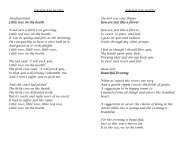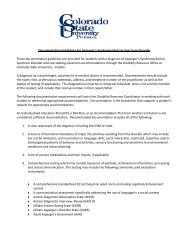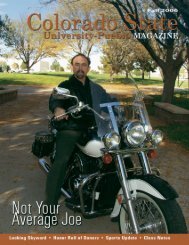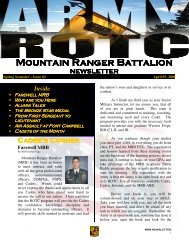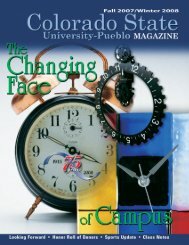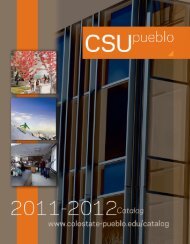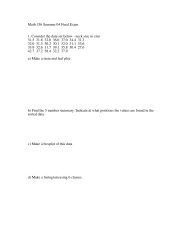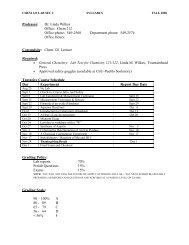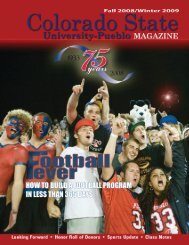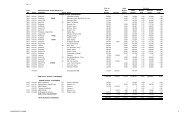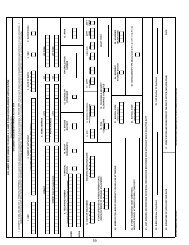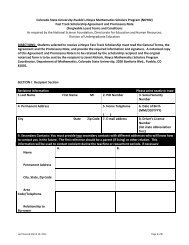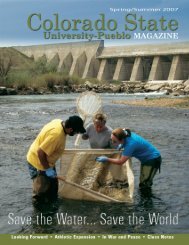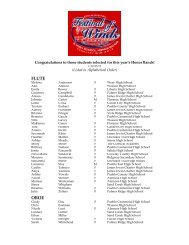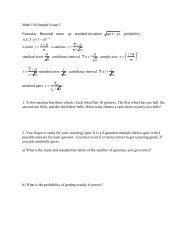2007-2008 Catalog (PDF) - Colorado State University-Pueblo
2007-2008 Catalog (PDF) - Colorado State University-Pueblo
2007-2008 Catalog (PDF) - Colorado State University-Pueblo
You also want an ePaper? Increase the reach of your titles
YUMPU automatically turns print PDFs into web optimized ePapers that Google loves.
CSU-<strong>Pueblo</strong><br />
ACADEMIC POLICIES<br />
Students are well advised to become familiar with the<br />
academic policies of the <strong>University</strong>. Each student owns<br />
the responsibility to comply with those policies.<br />
UNIVERSITY STUDENT RECORDS POLICY<br />
<strong>Colorado</strong> <strong>State</strong> <strong>University</strong>-<strong>Pueblo</strong>’s practice in regard<br />
to student record keeping and access is based on the<br />
provisions of the Privacy Rights of Parents and<br />
Students, Section 438 of the General Education<br />
Provisions Act, as amended (P.L. 93-380), also known<br />
as the Family Educational Rights and Privacy Act of<br />
1974 (FERPA), or the Buckley Amendment. For<br />
specific details, contact the Records Office,<br />
Administration Building, Room 202.<br />
ACADEMIC DISHONESTY<br />
Academic dishonesty is any form of cheating which<br />
results in students giving or receiving unauthorized<br />
assistance in an academic exercise or receiving credit<br />
for work which is not their own.<br />
In cases of academic dishonesty, the instructor will<br />
inform the chair of the department prior to implementation<br />
of punitive action. Academic dishonesty is grounds<br />
for disciplinary action by both the instructor and the<br />
Dean of Student Life. Any student judged to have<br />
engaged in academic dishonesty may receive a failing<br />
grade for the work in question, a failing grade for the<br />
course, or any other lesser penalty which the instructor<br />
finds appropriate.<br />
To dispute an accusation of academic dishonesty, the<br />
student should first consult with the instructor. If the<br />
dispute remains unresolved, the student may then<br />
state their case to the department chair (or the dean if<br />
the department chair is the instructor of the course).<br />
Academic dishonesty is a behavioral issue, not an<br />
issue of academic performance. As such, it is<br />
considered an act of misconduct and is also subject to<br />
the <strong>University</strong> disciplinary process as defined in the<br />
CSU-<strong>Pueblo</strong> Student Code of Conduct Policies and<br />
Procedures Manual. Whether or not punitive action<br />
has been implemented by the faculty, a report of the<br />
infraction should be submitted to the Dean of Student<br />
Life who may initiate additional disciplinary action. A<br />
student may appeal a grade through the Academic<br />
Appeals Board. The Dean of Student Life’s decision<br />
may be appealed through the process outlined in the<br />
Student Code of Conduct Policies and Procedures<br />
Manual.<br />
What Are Specific Acts of Academic Dishonesty?<br />
The following acts of misconduct are acts of academic<br />
dishonesty:<br />
1) Cheating—intentionally using or attempting to use<br />
unauthorized materials, information, or study aids<br />
in any academic exercise. The term academic<br />
exercise includes all forms of work submitted for<br />
credit or hours.<br />
2) Fabrication—intentional and unauthorized<br />
falsification or invention of any information or<br />
citation in an academic exercise; or of documentation<br />
meant to excuse or justify adjustments related<br />
to attendance or completion of work (exams,<br />
exercises, etc.)<br />
3) Facilitating Academic Dishonesty—intentionally or<br />
knowingly helping or attempting to help another to<br />
violate a provision of the institutional code of<br />
academic integrity.<br />
4) Plagiarism—the deliberate adoption or reproduction<br />
of ideas, words, or statements of another<br />
person as one’s own without acknowledgment.<br />
5) Unauthorized Collaboration—-intentionally sharing<br />
information or working together in an academic<br />
exercise when such actions are not approved by<br />
the course instructor.<br />
This is not meant to be an exhaustive list of all acts of<br />
academic dishonesty, but it is a guide to help faculty<br />
and students understand what constitutes academic<br />
dishonesty.<br />
CLASSROOM BEHAVIOR<br />
The classroom instructor is responsible for setting<br />
standards for all classroom conduct, behavior and<br />
discipline. Only enrolled students, administrative<br />
personnel and persons authorized by the instructor are<br />
permitted in classrooms and other instructional areas<br />
during scheduled periods. <strong>University</strong> policy and<br />
<strong>Colorado</strong> state law also prohibit all forms of disruptive<br />
or obstructive behavior in academic areas during<br />
scheduled periods or any action which would disrupt<br />
scheduled academic activity. Use of classrooms and<br />
other areas of academic buildings during nonscheduled<br />
periods is permitted only in accordance with<br />
<strong>University</strong> practices. Anyone in unauthorized<br />
attendance or causing a disturbance during scheduled<br />
academic activity may be asked to leave. If a person<br />
refuses such a request, he or she may be removed by<br />
the <strong>University</strong> Police and is liable to legal prosecution.<br />
38



